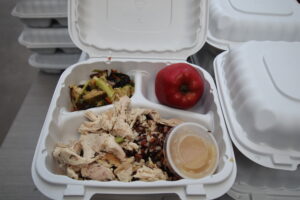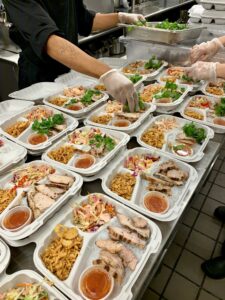By Greg Hernandez
Diamond Walker has always wanted to make hollandaise sauce without it curdling. She has finally managed to master that skill—and so much more—as she prepares to graduate from the Los Angeles LGBT Center’s unique Culinary Arts Program.
“I love the atmosphere here,” said Walker, 56, during a class break at the Anita May Rosenstein Campus’ commercial kitchen. “If I had gone to Le Cordon Bleu or another culinary school, it would be entirely different because there’s so much love, and friendly people, here. It’s a wonderful environment!”
Walker is one of the more than 100 students to have completed the 12-week, 300-hour program which launched in 2019. The intergenerational program is comprised of the Center’s youth members and seniors.
 In the two years since the program’s launch, its students and instructors have prepared 281,764 meals for Center youth members and senior clients. This total includes the approximately 425 boxed meals prepared and served daily during the COVID-19 pandemic.
In the two years since the program’s launch, its students and instructors have prepared 281,764 meals for Center youth members and senior clients. This total includes the approximately 425 boxed meals prepared and served daily during the COVID-19 pandemic.
“It was really important for us to keep the kitchen going throughout,” explained Director of Culinary Training and Operations Nick Panepinto. “We haven’t closed one day during the pandemic. Our culinary students aren’t just learning, but they are a vital part in helping to make all the meals and getting everything packaged.”
 Menu options during the pandemic have ranged from the classics—BLT sandwiches and grilled cheese with tomato soup, for example—to international dishes such as braised beef Banh Mi Vietnamese sandwiches and Pork Bun Cha (pictured, left) with rice noodles, pickled vegetables, cabbage slaw and crispy shallots.
Menu options during the pandemic have ranged from the classics—BLT sandwiches and grilled cheese with tomato soup, for example—to international dishes such as braised beef Banh Mi Vietnamese sandwiches and Pork Bun Cha (pictured, left) with rice noodles, pickled vegetables, cabbage slaw and crispy shallots.
“We tried to do a really great mix of meals because everything is served cold, and we still wanted to make sure it was creative and good,” Panepinto said.
For 31 students, the program was taught differently during the pandemic. The traditional teaching of such culinary basics as holding a knife, breaking down a chicken, and making sauces had to be learned apprentice-style during meal production versus the traditional individual classroom instruction.
“Instead of being very close in the classroom, they all learned by making the actual food for the boxed meals each day,” Panepinto said. “So they didn’t follow that same very structured classroom curriculum, but they still learned all the same fundamental skills. This allowed us to ensure they were fulfilling an essential job function while maintaining social distancing.”
On July 19, a new class of seven youth and two seniors begin with a return to the traditional teaching methods—they are the first students to fully enjoy classroom instruction in more than a year.
“We will have a full complement of students here and the full production kitchen,” said Executive Chef Director Leslie Riley. “They are a very motivated, really amazing group with different stories. When you are focused and dedicated to something daily, even for a short period of time, you will know you can do this. Within three months, you can really make a huge change within your own life.”
Riley, who joined the team earlier this year, said they made some adjustments to make the lessons more accessible, such as teaching the art of making French mother sauces.
“We are focusing on the modern kitchen and how French techniques really relate to it,” explained Riley. “When they make Béchamel, which is the French white sauce, that’s the sauce you use for biscuits and gravy. And when you put cheese in it and make a Mornay, our students take their sauces and turn it into mac and cheese. They take their Velouté and turn it into a creamed soup; their Espagnole into a steak sauce.”
Students also will learn molecular gastronomy techniques, such as sous vide cooking which involves cooking vacuum-sealed food in water at a precise and consistent temperature.
“What I love most about working with students, who may have had a lot of challenges and trauma, is that you can’t work in a kitchen and continue to feel like a victim,” Riley pointed out. “You develop so many skills and gain so much confidence. You learn teamwork, to work autonomously, and to trust your own judgment.”
Culinary Arts graduate Gio Bertucelli is living proof of that goal. She completed the program in early 2020 and was hired that summer to work at the Center’s social enterprise café, Liberation Coffee House.
“It’s been a new beginning for me,” said Bertucelli, who identifies as transgender. “The program gave me an opportunity to find myself through my passion for cooking—a passion which I learned from my father. It has helped me to reconnect with that part of my family, of my history, of my culture, and incorporate it with my new life.”
For more information about the Culinary Arts Program, visit lalgbtcenter.org/culinaryarts


